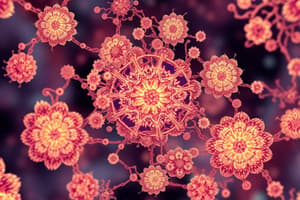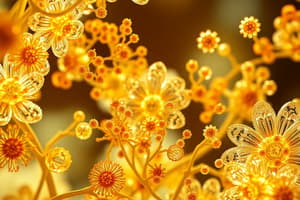Podcast
Questions and Answers
What is the correct order of the steps for adjusting the focus on a microscope?
What is the correct order of the steps for adjusting the focus on a microscope?
- Use the fine focus knob, then adjust the light intensity, finally adjust the ocular lens (correct)
- Use the course focus knob, then adjust the light intensity, finally adjust the ocular lens
- Use the light intensity, then adjust the ocular lens, finally use the fine focus knob
- Use the fine focus knob, then use the course focus knob, finally adjust the ocular lens
Which result indicates a positive test for reducing sugars in the Benedicts test?
Which result indicates a positive test for reducing sugars in the Benedicts test?
- Blue
- Purple/Green (correct)
- Red
- Yellow
What does a black color indicate in the iodine test for starches?
What does a black color indicate in the iodine test for starches?
- Neutral result
- Positive result (correct)
- Negative result
- Indeterminate result
What are the four nucleotides used in DNA?
What are the four nucleotides used in DNA?
What is the role of tRNA in protein synthesis?
What is the role of tRNA in protein synthesis?
Which kingdoms are included in the four kingdoms classification system?
Which kingdoms are included in the four kingdoms classification system?
What are the four steps of the scientific method in the correct order?
What are the four steps of the scientific method in the correct order?
What is the formula to calculate total magnification when using an ocular lens with a power of 10x?
What is the formula to calculate total magnification when using an ocular lens with a power of 10x?
Which are the three domains of life?
Which are the three domains of life?
When should you start on when using a microscope to view a slide?
When should you start on when using a microscope to view a slide?
What is the purpose of lysis buffer in DNA isolation?
What is the purpose of lysis buffer in DNA isolation?
Which nitrogenous base is unique to RNA and not found in DNA?
Which nitrogenous base is unique to RNA and not found in DNA?
Flashcards are hidden until you start studying
Study Notes
Scientific Method and Microscopy
- The scientific method involves four steps: Observe, Hypothesize, Test, Interpret
- The formula to calculate total magnification is objective x ocular
- Start with the red objective lens (10x) when using a microscope
- Use the coarse focus knob only for rough focusing under low magnification
- Use the fine focus knob to bring the sample into fine focus
- Adjust the light intensity using the rheostat or condenser
- Adjust the ocular lens to see only one image
- The iris controls the amount of light entering the condenser
Cell Biology
- The three domains of life are Bacteria, Archaea, Eukarya
- The four kingdoms are Protista, Fungi, Plantae, Animalia
- Protists are typically present in pond water
- Fungi include yeast and mold
Cell Structure and Function
- Ribosomes are composed of ribosomal RNA and proteins
- Transfer RNA (tRNA) participates in protein synthesis
- Transcription is the process of making mRNA
- Translation is the process of making proteins using mRNA
- DNA is composed of nucleotides that code proteins
- The four nucleotides used in DNA are Adenine, Thymine, Guanine, Cytosine
- Proteins are structural and functional molecules that carry out most cellular activities
Genetics
- Alleles are alternative forms of a gene
- Possible allele pairs include homozygous dominant (BB), homozygous recessive (bb), heterozygous (Bb)
- A hypothesis is a plausible explanation for what is already known
- A control group is not exposed or treated in experiments
- An independent variable is not affected by other variables
- A dependent variable is affected by other variables
Diseases and Tests
- Sickle cell anemia is a mutation that changes a protein, resulting in sickled red blood cells
- In the Sudan test for lipid, positive results show orange and negative results show red
- In the Biuret test for protein, blue indicates a negative result and purple/green indicates a positive result
- In the Benedict's test for reducing sugars, red/yellow indicates a positive result and blue indicates a negative result
- In the Iodine test for starches, yellow and orange indicate a negative result and black indicates a positive result
Studying That Suits You
Use AI to generate personalized quizzes and flashcards to suit your learning preferences.




